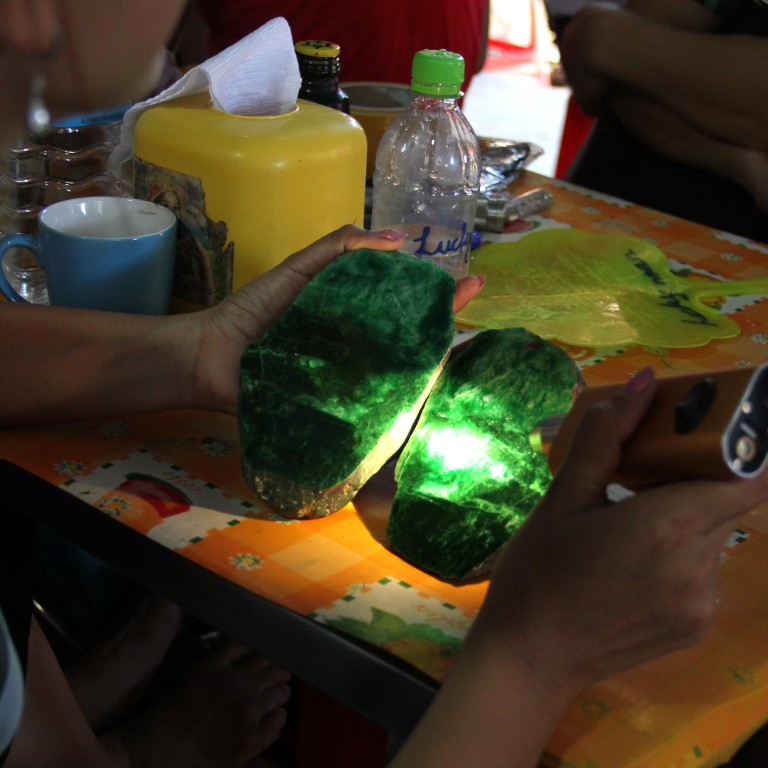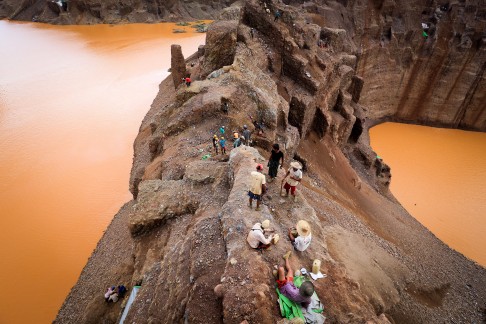
Revealed: Myanmar’s US$31 billion jade mining industry and its 'ties to country's elite'
Report by Global Witness investigates murky and lucrative trade of gems
The highly lucrative industry of jade mining is complicating Myanmar’s democracy process because of a lack of transparency and the involvement of key players closely associated with the former junta government, according to an investigation by an international non-governmental organisation.
While oil and gas, long thought to be the resource-rich country’s key source of income, raked in US$4.3 billion last year, a report by Global Witness put the revenues brought in by jade mining at US$31 billion during the same period.
The calculation, however, was based on incomplete government data that had glazed over the fact that more than 50 per cent of the jade stones mined in the country were smuggled out, said Michael Davis, a lead researcher of the report and Global Witness’s Asia Director.
“What we are trying to do with our estimate is to make the point that this is worth tens of billions of dollars a year, far more than oil and gas, it needs to be the focus of the reform efforts,” Davis said.

What the report was unable to find out, Davis said, was how the huge sums of money were spent as most of the industry’s basic information had been kept under wraps.
In Myanmar, authorities have long said the jade mining industry cannot be administered or regulated because the gem stones are produced in a remote and conflict-ridden corner of the country. But the report argued that, contrary to the established narrative, the government was in full control of major mines in Hpakant Township.
The report cited a jade businessman as saying that the government had kept the jade data secret because, if published, “the whole world would know that the locals get no benefits …and how much mining tax the government should get.”
A Mines Ministry official, asked to comment on the report, said his ministry transferred all tax revenue from the mines to the Finance Ministry. "Then the Ministry of Finance would allocate budgets to the states and regions."
Companies named in the report did not immediately respond to requests for comment on it.
Through interviews with key players, the report revealed that that the government’s system for allocating and managing jade mines, particularly in the government-controlled areas of Hpakant Township, was fraught with corruption, allowing elite figures to cream off most of the profits.

The report found many of the big mining operators were linked to high-ranking officials, such as the family of former dictator Than Shwe and the Minister of Livestock, Fisheries and Rural Development Ohn Myint, and army-controlled firms such as the Myanmar Economic Holdings Limited.
“They are the people who are more or less associated with the bad old days, which Myanmar chose to leave behind as of 2011,” said Davis.
Industry insiders also told the organisation that almost all jade mining companies had a “hidden” Chinese investor, who would provide capital, funding and sometimes the necessary skills. Under Myanmese laws, it is unlawful for foreigners to invest in mineral mining.
As the country gears up for its first general elections since the end of military rule in 2011 next month, many are watching if the country’s is leading to meaningful political transitions.
With the jade mines mostly controlled by the powerful elites, Davis described the situation as potentially dangerous “where some of the most trenchant opponents of reform have access to what is effectively a huge off the book slush fund”.
Under President Thein Sein, the Myanmar government has signed up to the Extractive Industries Transparency Initiative, an internationally recognised standard to promote open and accountable management of natural resources.
But Davis said Myanmese government officials had been reluctant to include jade mining into the initiative. “From what we can see the government doesn’t want to bring jade into EITI process unless it is really forced, because they know who is involved, and just how big the toes are that may potentially get trampled on if greater transparency is brought to this business.”

In light of a possible new government after elections next month, Davis said major licensed companies had sped up their mining operations for fear that a change in the political climate might bring serious consequences.
But even if the opposition National League for Democracy won the elections, the rate of change in the jade industry would be slow, Davis said.
“Somebody needs to come in and have a fresh look at this, and recognise that issue for what it is,” Davis said.
Additional reporting by Reuters
